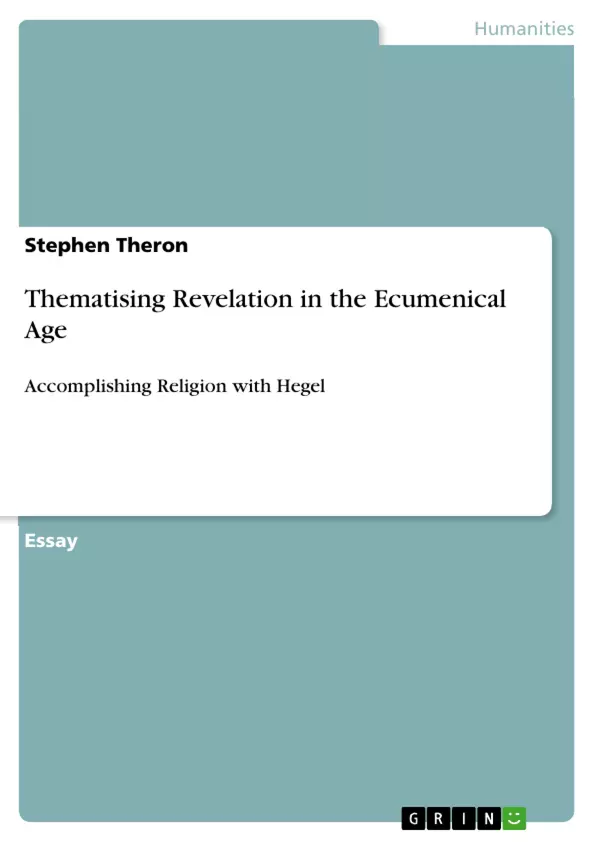This is part of a constructive project of rethinking Christian or other doctrine for our age. It is neither reductive nor rationalist but a development, inclusive of a development of the doctrine of development itself.
Inhaltsverzeichnis (Table of Contents)
- Introduction
- I. Revelation as Covenant
Zielsetzung und Themenschwerpunkte (Objectives and Key Themes)
The text explores the concept of revelation in the context of the ecumenical age, examining how it relates to both traditional and philosophical perspectives. It aims to demonstrate the significance of revelation as a driving force behind religious and philosophical thinking, highlighting its impact on shaping beliefs and practices.
- The nature of revelation and its role in defining religious traditions
- The relationship between revelation and human finitude
- The process of internalization and the "birth of Christ in the soul"
- The relationship between revelation, faith, and reason
- The concept of "chosenness" and its implications for tolerance and understanding
Zusammenfassung der Kapitel (Chapter Summaries)
- Introduction: This chapter introduces the concept of revelation as an intervention from on high, distinguishing it from other religious philosophies and practices. It examines the tradition of revelation and its role in shaping cultural beliefs. The chapter also explores the tension between finitude and the transcendent, referencing figures like Hegel and McTaggart.
- I. Revelation as Covenant: This chapter delves into the concept of revelation as a covenant between God and humanity, focusing on the Jewish tradition of "chosenness." It analyzes how this concept of chosenness relates to the Christian belief in Jesus as the "way" and explores the implications of this for universalism and tolerance. The chapter utilizes Hegelian idealism and the concept of a "kingdom of ends" to examine the potential for reconciliation between seemingly conflicting perspectives.
Schlüsselwörter (Keywords)
The text explores key concepts such as revelation, covenant, finitude, chosenness, tolerance, internalization, faith, reason, Hegelian idealism, kingdom of ends, and the "birth of Christ in the soul."
Frequently Asked Questions
What is the central theme of "Revelation in the Ecumenical Age"?
The text explores the concept of divine revelation as an intervention that shapes religious traditions, focusing on its role in faith, reason, and modern theology.
What does "Revelation as Covenant" mean?
It refers to the Jewish tradition of "chosenness" and the divine agreement between God and humanity, analyzed through philosophical lenses like Hegelian idealism.
How does the text view the relationship between faith and reason?
It examines the tension between the two, suggesting that revelation can be a driving force for both religious and philosophical thinking without being purely rationalist.
What is meant by the "birth of Christ in the soul"?
This concept describes the process of internalizing divine revelation, moving from an external historical event to a personal spiritual experience.
Does the text address religious tolerance?
Yes, it explores the implications of "chosenness" and universalist beliefs for fostering understanding and tolerance in an ecumenical society.
- Quote paper
- Dr. Stephen Theron (Author), 2009, Thematising Revelation in the Ecumenical Age, Munich, GRIN Verlag, https://www.grin.com/document/126941



